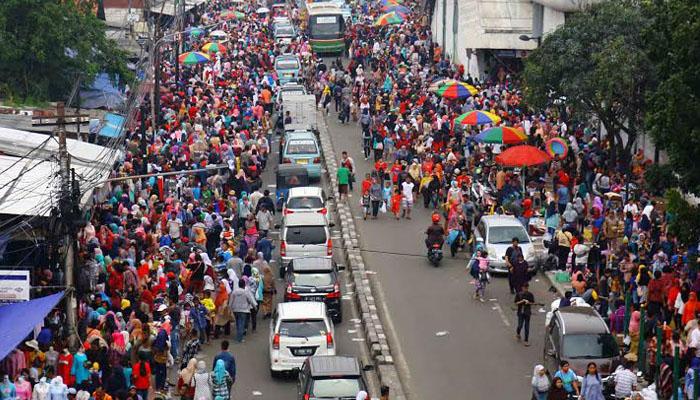Last month, Indonesia’s Supreme Court decided to strike down an article in a 2007 regional law that gave the governor of Jakarta the authority to close roads and sidewalks for use by public traders. Pedestrian rights activists hailed the decision, which they hoped would lead to more walkable sidewalks throughout the city, particularly in areas of the capital like Tanah Abang where large numbers of street vendors make it difficult for pedestrians and traffic to move along the roads.
But Jakarta Governor Anies Baswedan says the Supreme Court’s decision will have no bearing on his plans to allow street vendors to continue to crowd the capital’s sidewalks, claiming that several other applicable laws still give him the authority to let sellers utilize the public walkways as their commercial space.
“There are many legal bases (for allowing vendors to use the sidewalk). So even if that one article is overturned, don’t think that it removes the right altogether. (The article in the 2007 2007 regional bylaw) is more of a road regulation than a sidewalk regulation. there are still many other legal bases to these rules,” Anies said today at City Hall as quoted by Liputan 6.
Last month’s Supreme Court decision was based on a lawsuit filed by William Aditya Sarana, a member of the Jakarta City Council from PSI (the Indonesian Solidarity Party, one of the youngest and most progressive political parties in the country) in which he challenged an article in the 2007 Regional Law on Public order that gave the governor of Jakarta the authority to close roads and sidewalks for use by public traders.
The Supreme Court judges agreed with William’s argument that the law conflicted with article 127 of the 2009 Law on Traffic and Road Transportation, which stipulates that roads and sidewalks can only be closed for religious, state, sport and cultural activities, and thus should be nullified.
However, Governor Anies cited several other laws that he said still gave him the power to authorize street vendors using sidewalks, including an article from the 2014 Ministry of Public Works regulation concerning guidelines for the planning, provision, and utilization of pedestrian network infrastructure and facilities in urban areas as well as a 2015 gubernatorial regulation concerning the organization and empowerment of street vendors .
The governor spoke about his legal basis for allowing and regulating street vendors while talking to the media about his vision for making Jakarta’s sidewalks “multifunctional spaces” in which parts of the walkway would be devoted to vendors while the rest would be kept clear for pedestrians. He also said that many large, well-organized cities like New York City allowed for street vendors in many locations.
While it’s true that New York City has plenty of street vendors, anybody who has been there can tell you that NYC has far more sidewalks and is many times more walkable than Jakarta. One can only hope that Governor Anies is able to keep street vending well regulated so that they don’t end up crowding the capital’s many recently refurbished walkways.




